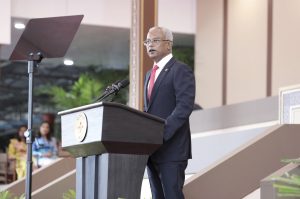In 2018, the Maldives’ election delivered a shocking upset: Strongman President Abdulla Yameen was ousted by the people. Opposition candidate Ibrahim Mohamed Solih won a landslide victory in the polls, promising to bring transparency, accountability, and above all democracy back to the island nation. Two years after Solih’s inauguration, what does the Maldives’ political landscape look like?
The Diplomat’s Shannon Tiezzi spoke with JJ Robinson, the author of “Maldives: Islamic Republic, Tropical Autocracy” (Hurst, 2015), about the country’s politics, past and present. According to Robinson, the former editor of the Maldives’ first independent news outlet, Minivan News/Maldives Independent, “The Maldives observes the pageantry of democratic politics, but it is still very much in the latter stages of a bruising transition from decades of autocracy.”
President Ibrahim Mohamed Solih came to office promising to restore human rights and democratic principles in the Maldives. Two years later, what progress has been made?
The opposition Maldivian Democratic Party (MDP)’s overwhelming victory in the 2018 election surprised everybody – especially incumbent President Abdulla Yameen, who derailed the promising young democracy in 2013 and spent much of his rule steering it back toward authoritarianism. Showing signs of increasing paranoia, Yameen had alienated and imprisoned key allies, controlling the rest through a combination of fear, bribery, and a thoroughly compromised judicial system. With little in the way of genuine political affection, many supporters deserted him the moment the writing was on the wall.
MDP’s President Solih inherited a mess. Not only had most of the Maldives’ supposedly independent commissions and human rights institutions been gutted, corrupted, or compromised, but there were glaring questions about what do to with Yameen’s former allies, such as former Defense Minister Mohamed Nazim and tourism tycoon Gasim Ibrahim. These characters fell out of favor with the autocrat, but had also been instrumental in forcibly overthrowing the MDP’s first government in the 2012 coup. The MDP, at heart still a party of activists turned politicians, were divided between idealists who wanted to stick to the party’s progressive human rights roots, and the pragmatists, who saw inclusion of the less democratically-salubrious as a necessary compromise for political survival. The tension still exists, and has hindered the government’s ability to address human rights issues including Islamic fundamentalism, freedom of expression, and the rights of migrant workers.
Solih was a cofounder of the MDP, but until he was put forward as a presidential candidate was a background figure overshadowed by former President Mohamed Nasheed. Nasheed, a former political prisoner internationally famous for his environmental advocacy and energetic political idealism, was the MDP’s preferred election candidate. He easily won the primary, but Yameen’s pet courts declared his candidacy invalid and forced his replacement just days before the vote. Solih has shrugged off implications of being a Nasheed substitute by bringing a calm and measured tone to the normally fiery and impulsive Maldivian politics. Nasheed has meanwhile brought new energy to his role as speaker of parliament, using the MDP’s supermajority to repair the damage of both the Yameen era and previous 40 years of dictatorship his own presidency briefly interrupted.
The Maldivian Twittersphere occasionally erupts in speculation over tensions between the two leaders, prodded by the odd factional interest, but this is probably overstated. If there’s major backroom disagreement, it’s probably over the degree of tolerance for the corruption of those brought into the new government for the sake of stability. Idealism saved the Maldives from oppressive dictatorship; pragmatism may stop it reverting, but lose it the support of an increasingly cynical grassroots.

































